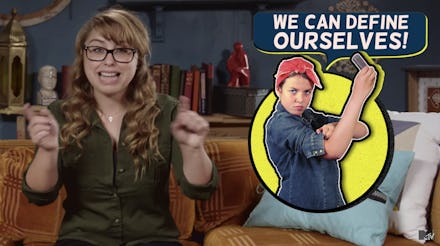The Big Problem With Selfie-Shaming We Don't Talk About Enough

If there was anything to be learned from last week's baseball selfie incident, in which a fun-loving gaggle of sorority girls were straight-up mocked by grown men for snapping some forward-facing phone shots with their chili dogs, it's that selfie-shaming has officially gotten out of hand.
While some people criticize young women for taking selfies, accusing them of being nothing more than narcissistic millennials, we know by now that there's a double standard at play when it comes to selfie-shaming. When men ridicule women for feeling themselves enough to capture the moment on camera, there's a lot of sexist bullshit at play.
While these concepts can be a little complicated, delightful Internet sex guru Laci Green has just broken it all down for viewers of her MTV digital series Braless. In the clip, Green uses the baseball selfie debacle to make an important point about what happens every time a man is compelled to make fun of a woman for busting out the selfie-stick.
She begins by pointing out that society has put forth a wholly unrealistic set of female beauty standards. But for some reason, it also derides any women who seem to "try too hard" to conform to them.
For women, these mixed messages result in an awful lot of self-loathing. Green cites the fuckboys of Tinder (or men who insult women with sexist insults the moment they're rejected) and the problematic One Direction song "You Don't Know You're Beautiful," in which a woman is praised simply because she doesn't know she's attractive, as examples of how low self-esteem is more or less just expected from women.
"Why do we romanticize girls with low self-esteem?" Green asks, before putting forth two possible explanations:
The first is the multi-billion dollar beauty industry:
And the second, as was made painfully clear throughout the baseball selfie clip, is good old-fashioned sexism:
Nowhere is the sexism more apparent than in the insults that accompany selfie-shaming. As Erin Tatum wrote for Everyday Feminism last year, "It's not a coincidence that many of the unsavory personality traits associated with a selfie obsession — being superficial, vain, lazy, or desperate — are also commonly used as misogynistic insults against young girls."
But rather than allowing such insults to shame women, Green argues that the selfie can be used as a "radical tool of defiance" against sexism.
By allowing women to take control of their images, selfies actually serve as an empowering tool to snatch women's bodies from the male gaze, putting their own representation into their own hands (literally). Selfies allow women to be seen for who they are, even if they don't fit into the conventional standards that society and pop culture might otherwise expect of them.
This theory has good company in the world of academia. In a paper published over the summer, University of California, Santa Cruz, professor Derek Conrad Murray made a solid argument that the selfie is "one of the most effective outlets for self-definition" and "a radical act of political empowerment: as a means to resist the male-dominated media culture's obsession with and oppressive hold over their lives and bodies."
Green wraps up her video by encouraging young women to keep on keepin' on with their unabashed selfie game, and urges the rest of us to think about the messages we're sending when we criticize selfie-takers.
Watch the full clip below: